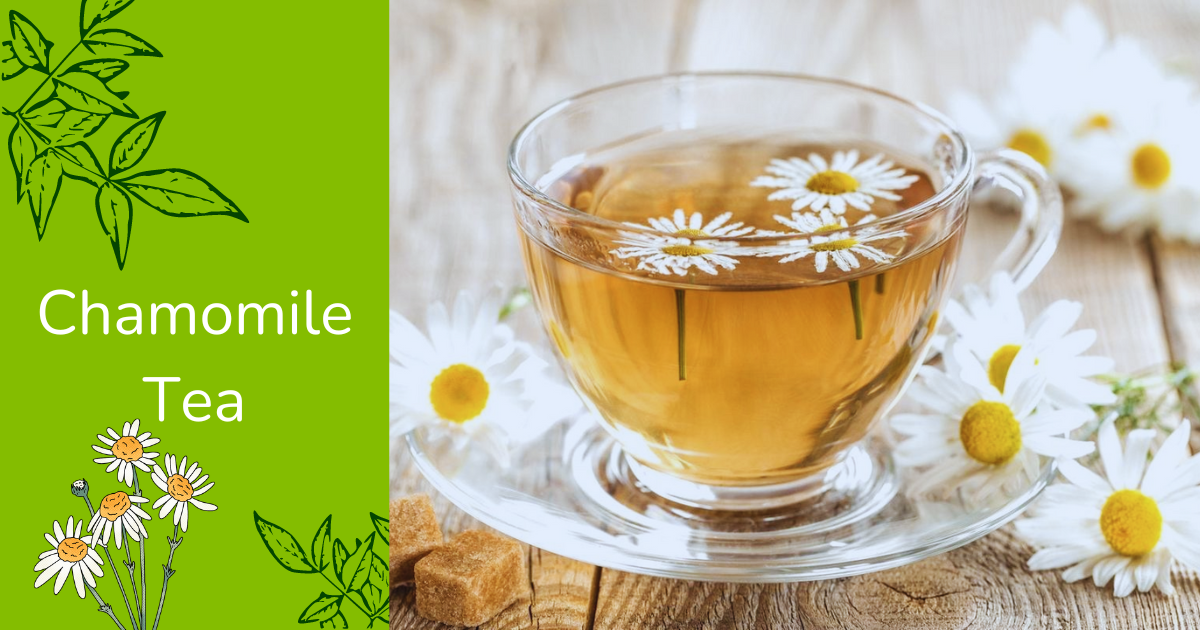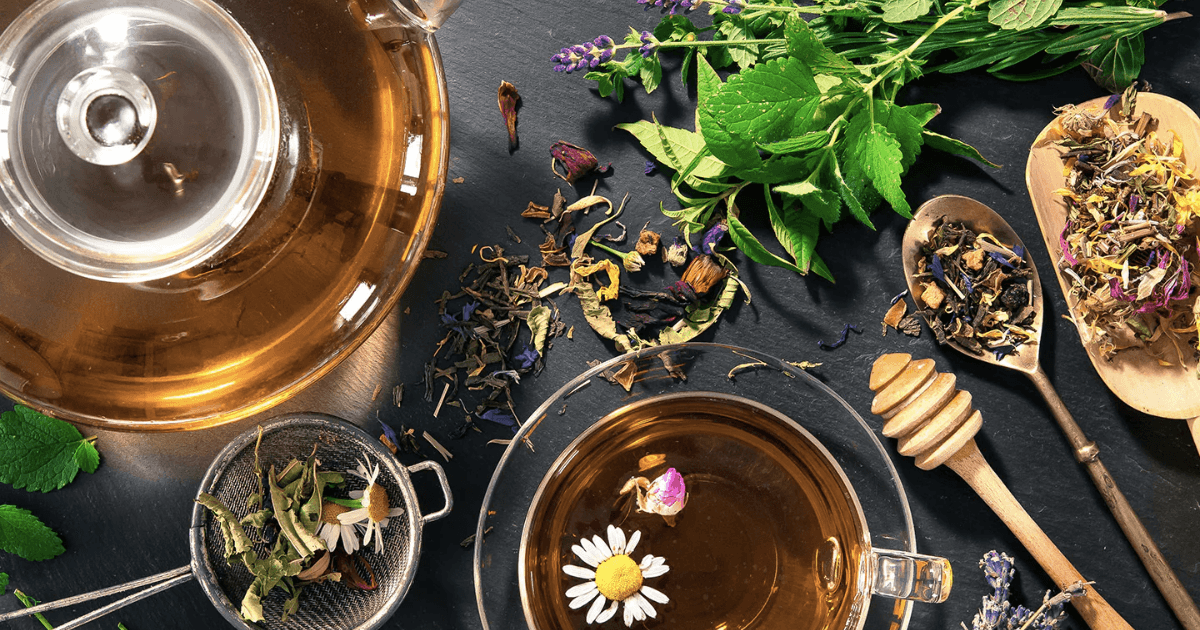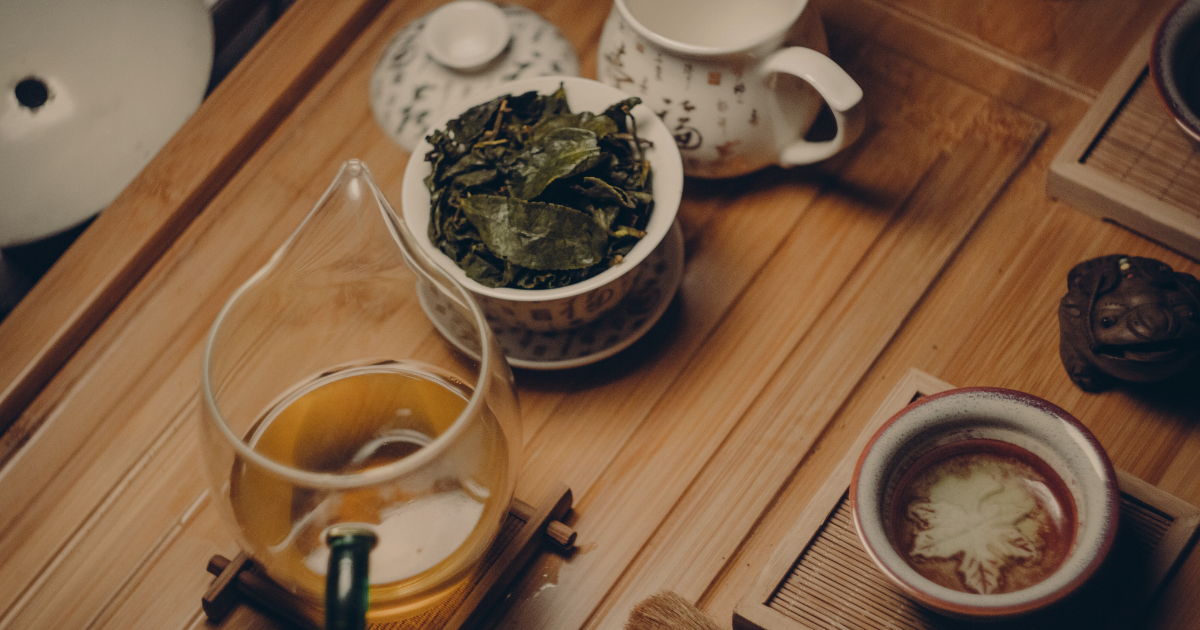
The Rise of Herbal Tea
Herbal tea is much more than just a simple drink. It is a cultural tradition [1] that has been passed down through the ages, spanning continents and generations.
The significance of herbal tea symbolizes warmth, wellness, and connection across the globe. Its recipes carry the wisdom of our ancestors and offer a glimpse into the rich tapestry of cultural heritage.
Today, in our fast-paced world, the renewed popularity reflects our shared desire for natural remedies and holistic wellness practices. Whether enjoyed as a morning ritual to start your day or as a calming bedtime elixir to unwind, herbal tea brings people of all backgrounds together with its timeless appeal and countless benefits.
Health Benefits of Herbal Tea
Antioxidant Properties
Herbal teas contain high levels of antioxidants, which play a crucial role in safeguarding the body from damage caused by free radicals. These unstable molecules can harm cells and lead to various health issues, including inflammation, aging, and chronic diseases [2], such as atherosclerosis, emphysema, and cancer.
Ingredients like green tea, rooibos, and hibiscus are rich in antioxidants and serve as protection against various chronic diseases. Some herbal tea blends may include green tea leaves to provide additional flavor, aroma, or health benefits.
Epigallocatechin Gallate (EGCG)[3] is a type of antioxidant present in green tea and contributes to the overall antioxidant profile of the herbal tea blend. EGCG protects cells from the damage caused by oxidative stress and reduces the activity of pro-inflammatory chemicals that are produced in the body.
Digestive Health
Herbal teas have been revered for centuries for their remarkable ability to soothe the stomach and promote healthy digestion.
Ingredients like ginger, peppermint, and fennel are key players in the digestive system, offering relief from bloating[4], indigestion, and gastrointestinal discomfort. These natural remedies contribute to improved digestion and overall gastrointestinal health.
Drinking herbal teas can leave you feeling lighter, more comfortable, and ready to take on the day with ease. This offers a gentle yet effective solution for maintaining optimal digestive health.
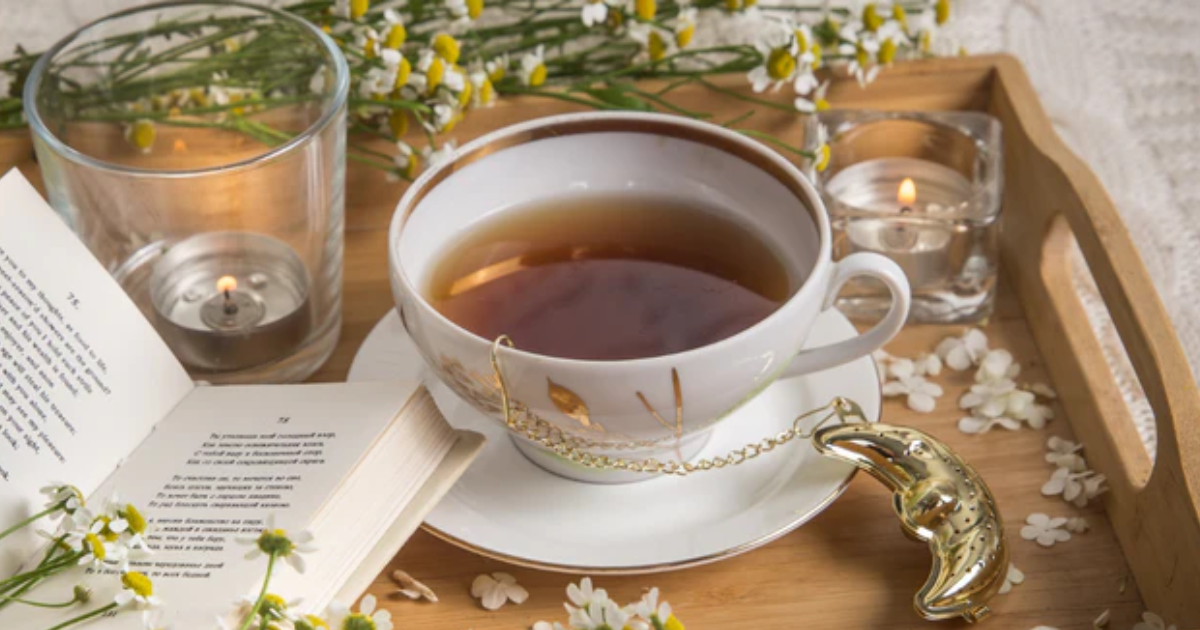
Stress Reduction and Relaxation
In today's fast-paced world, stress has become a common cause of digestive issues. Thankfully, herbal teas offer a natural way to relax and reduce stress levels!
A randomized clinical trial[5] was conducted to examine the impact of lavender herbal tea on anxiety and depression in elderly individuals. It was found that participants who consumed lavender herbal tea experienced a significant reduction in both anxiety and depression symptoms.
The act of brewing and enjoying a warm cup of herbal tea can be a mindful practice in itself. It offers a moment of respite from the hustle and bustle of daily life and promotes relaxation.
Weight Management
Herbal tea can be a great addition to your health routine if you're looking to manage your weight and improve your overall health.
It contains antioxidants and metabolism-boosting compounds that can help reduce cravings and appetite. Additionally, it can help you control your portion sizes and avoid overeating.
Improved Sleep Quality
Caffeine is a natural stimulant that helps to improve alertness and wakefulness. However, consuming excessive caffeine intake can affect both the quantity and quality of sleep, which can have negative effects on overall well-being.
Herbal tea, on the other hand, is typically caffeine-free, making it an excellent choice for promoting better sleep. This makes herbal tea a popular option[6] for those looking to unwind and prepare for bedtime.
Specific Herbal Teas and Their Benefits
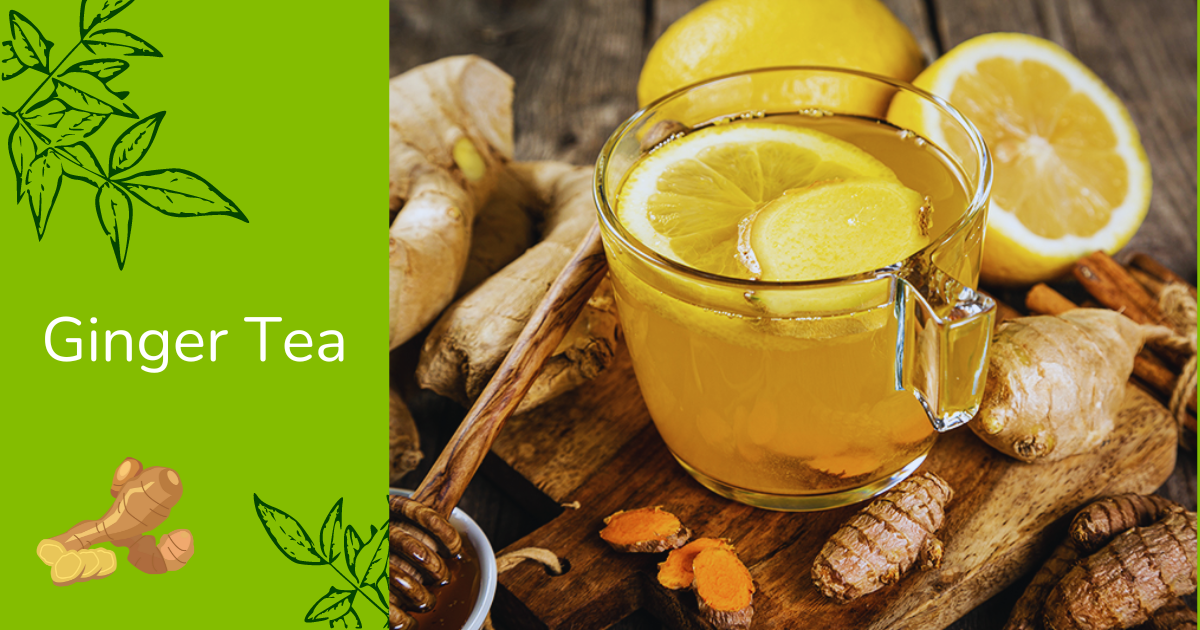
Ginger tea is a warm and spicy beverage made from ginger root, known for its soothing properties and distinct flavor.
Ginger Tea Benefits
- Soothes digestive discomfort.
- Alleviates nausea.
- Reduces bloating and indigestion.
- Contains anti-inflammatory properties.
- Helps boost the immune system due to its antioxidant content.
Peppermint tea is a refreshing herbal infusion made from peppermint leaves, prized for its cool and invigorating taste.
Peppermint Tea Benefits
- Relieves symptoms of indigestion, gas, and bloating.
- Refreshing flavor and aroma.
- Promotes relaxation and freshens breath.
Chamomile tea is a gentle and soothing herbal drink made from dried chamomile flowers, known for its calming effects and delicate floral taste.
Chamomile Tea Benefits
- Calming and relaxing effects.
- Reduces anxiety and promotes sleep.
- Natural remedy for insomnia, stress, and anxiety.
- Soothes digestive issues and menstrual cramps.
-1.png?width=1200&height=630&name=health-benefits-of-herbal-tea%20(1)-1.png)
Green tea is a popular and versatile beverage made from the leaves of the Camellia sinensis plant, celebrated for its earthy flavor and numerous health benefits.
Green Tea Benefits
- High antioxidant content, particularly EGCG.
- Improves heart health and reduces inflammation.
- Potential cancer-fighting properties.
- Moderate caffeine content provides a gentle energy boost.
How to Incorporate Herbal Tea into Your Wellness Routine
1. Start Your Day with Herbal Tea: Consider replacing your morning coffee or sugary drink with a cup of herbal tea. Choose energizing herbal teas such as green tea or ginseng tea to give your day a natural boost of energy. Not only will you hydrate your body, but you'll also infuse it with antioxidants and nutrients to strengthen your immune system.
2. Create a Relaxing Evening Ritual: Drinking a warm cup of herbal tea before bed can help you relax and get ready for sleep. It signals to your body that it's time to wind down and helps you feel peaceful. It's important to take time to relax after a busy day, and herbal tea is one way to do that.
3. Stay Hydrated Throughout the Day: Keep a thermos or bottle of herbal tea with you throughout the day to stay hydrated and refreshed. Herbal teas not only taste great, but also offer many health benefits that can support your overall wellness goals.
4. Use Herbal Tea as a Stress Reliever: Take moments throughout the day to pause and recharge with a soothing cup of herbal tea. By incorporating herbal tea breaks into your daily routine, you can find moments of peace and tranquility amidst the busy hustle and bustle of everyday life.
5. Enjoy Herbal Tea with Family and Friends: Share the joy of herbal tea with family and friends by hosting a tea party or gathering. Cultivate moments of connection and relaxation with those you care about while enjoying the nourishing properties of herbal tea.
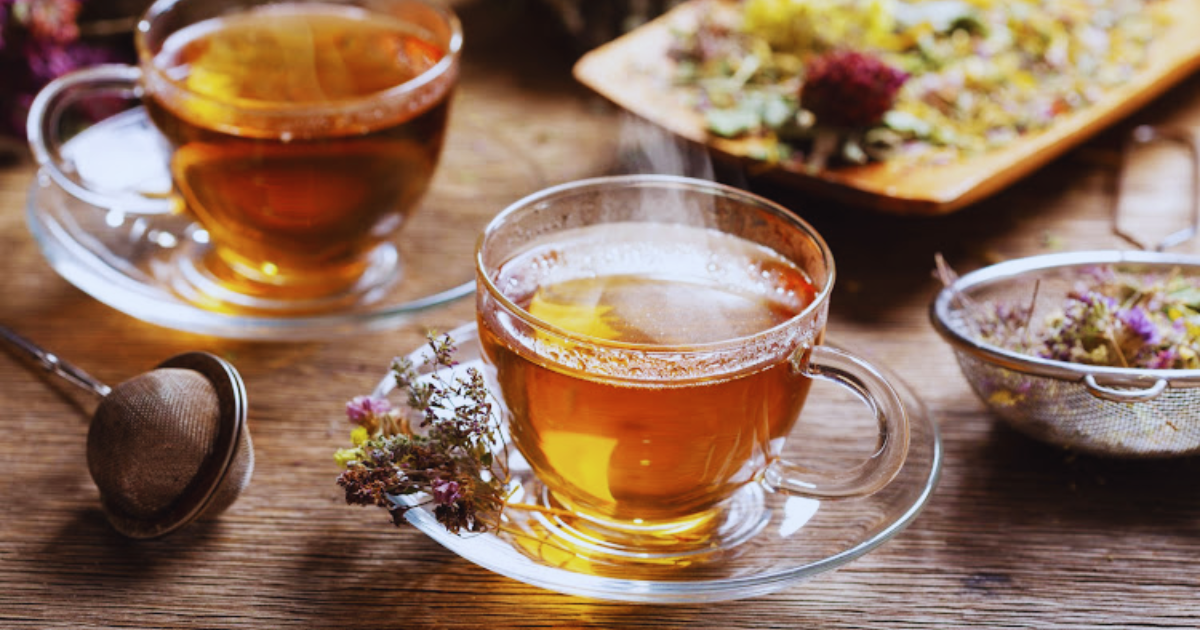
Tips for Brewing the Perfect Cup of Herbal Tea
1. Start with Quality Herbs:
- Opt for fresh, organic herbs for the best flavor.
- If using dried herbs, ensure they are high-quality and additive-free.
2. Use Filtered water:
- Choose filtered or spring water to avoid unwanted flavors.
- Clean water allows the true flavors of the herbs.
3. Mind the Temperature:
- Use boiling water for heartier herbs like ginger, and slightly cooler water for delicate herbs like chamomile.
4. Steeping Time:
- Follow recommended steeping times to avoid bitterness.
5. Mindful Preparation:
- Appreciate the aroma of the herbs as you prepare your tea.
- Use a teapot or infuser that allows the herbs to fully infuse their flavors.
6. Enhance with Natural Sweeteners:
- Experiment with honey, agave, or fresh citrus to add depth to your tea.
7. Savor the Experience:
- Take a moment to relax and enjoy your freshly brewed cup of herbal tea.
Precautions and Considerations
Allergies and Sensitivities
-
Be mindful of potential allergic reactions to specific herbs used in herbal teas.
- Read the list of ingredients for herbal teas and avoid those containing ingredients that may trigger an allergic reaction.
Medication Interactions
-
Seek guidance from a healthcare provider to avoid potential interactions with medications.
- Certain herbs used in herbal teas may interact with medications, either enhancing or diminishing their effects.
Quality and Source
-
Choose high-quality herbal teas from reputable sources to ensure purity and potency.
-
Look for organic and sustainably sourced herbs to minimize exposure to pesticides and other contaminants.
Dosage and Frequency
-
Follow recommended dosage guidelines and avoid excessive consumption.
- Drinking large quantities of herbal tea or using highly concentrated herbal preparations may lead to adverse effects.
Individual Variability
-
Each person may respond differently to herbal teas based on factors such as age, health status, and individual sensitivities.
-
Monitor your body's response to herbal teas and discontinue use if you experience any adverse reactions.
Pregnancy and Nursing
- Consult a healthcare professional before consuming herbal teas during pregnancy or while breastfeeding.
- Pregnant and breastfeeding women should exercise caution when consuming herbal teas, as some herbs may have effects on pregnancy or lactation.
Herbal Tea Safety for Children
- Consult with a pediatrician before giving herbal teas to children.
- Exercise caution when giving herbal teas to children, as their bodies may react differently to certain herbs.
Choosing a healthy plant-based and vegan diet is most beneficial when it comes to:

-
Higher levels of energy;
-
Improved sleep;
-
Aids in energy and overall happiness;
-
Provides a sense of comfort and relief;
-
Could prevent major diseases such as obesity and diabetes;
-
Accomplish weight loss and management; and
-
Improves mental and cognitive functioning.
There are really no excuses not to try healthier habits in your everyday life. If you are a man or woman looking for specific benefits of adopting healthier habits or just want to know about the general healing properties of herbs. Please remember to comment, post any health questions, or contact us directly!
Also, feel free to share any of your favorite recipes to make and share it with the Assuaged community on our ➡️ Share A Recipe ⬅️ page!









.png?width=1200&height=630&name=health-benefits-of-herbal-tea%20(1).png)
